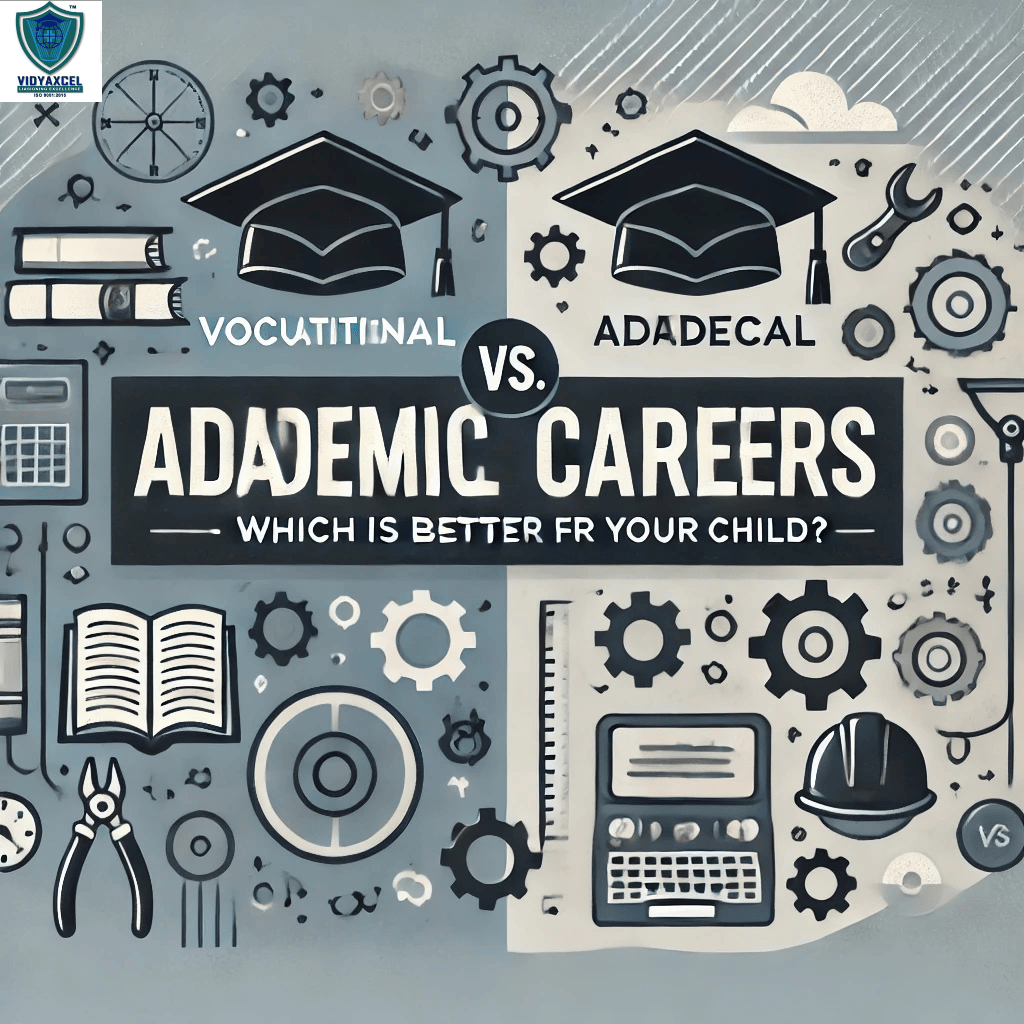Blog Details

29Mar
Vocational vs. Academic Careers: Which is Better for Your Child
One of the biggest decisions parents and students face is choosing between a vocational career (skill-based) and an academic career (degree-based). With changing job markets and evolving industries, both paths offer valuable opportunities. While vocational careers focus on hands-on skills and quicker entry into the workforce, academic careers provide a strong foundation for research-based and professional roles. The right choice depends on your child’s interests, abilities, and career aspirations. In this article, we’ll explore the pros and cons of each path to help you determine the best fit for your child’s future.
1. Understanding Vocational and Academic Careers
Vocational Careers (Skill-Based)
Vocational careers focus on practical, hands-on skills that lead to direct employment in specific industries. These careers usually require certifications, apprenticeships, or trade school education rather than traditional university degrees.
Examples:
✅ Electrician
✅ Plumber
✅ Mechanic
✅ Chef
✅ Graphic Designer
✅ Welder
✅ Cosmetologist
✅ Healthcare Technician
Pros:
✔️ Faster entry into the workforce (usually 1-2 years of training)
✔️ Lower education costs compared to a university degree
✔️ High demand for skilled trades in many industries
✔️ Hands-on learning, ideal for students who prefer practical work
Cons:
❌ Limited flexibility to switch industries
❌ Some trades may require physical labor
❌ Income growth may be slower compared to certain academic careers
Academic Careers (Degree-Based)
Academic careers involve theoretical and research-based education through college or university. These careers often require a bachelor’s, master’s, or even a doctoral degree before entering the workforce.
Examples:
✅ Doctor
✅ Engineer
✅ Lawyer
✅ Teacher
✅ Scientist
✅ Psychologist
✅ Architect
Pros:
✔️ Greater career flexibility and job opportunities
✔️ Higher potential earnings in the long term
✔️ Prestige and professional recognition
✔️ Opportunities for research, innovation, and leadership roles
Cons:
❌ Longer education time (3-8+ years)
❌ Higher tuition fees and potential student debt
❌ Competitive job markets in some academic fields
2. Key Factors to Consider
🔹 Your Child’s Interests & Strengths – Does your child enjoy hands-on work, or do they prefer academic studies and research?
🔹 Job Market Demand – Research careers that have strong future demand to ensure stability and growth.
🔹 Learning Style – Some students thrive in hands-on learning, while others excel in theoretical studies.
🔹 Financial Considerations – College degrees can be expensive, whereas vocational programs are often more affordable.
🔹 Long-Term Career Growth – Consider the potential for promotions, further education, and salary growth in each career path.
3. A Middle Path: Combining Vocational & Academic Skills
Many careers today blend both vocational and academic skills. For example
✅ Tech Careers: Coding, UI/UX design, and cybersecurity require practical skills and certifications but may not need a full degree.
✅ Healthcare Careers: Some medical professions (like nursing or radiology techs) require both hands-on experience and academic qualifications.
✅ Entrepreneurship: Many successful entrepreneurs start with hands-on skills (e.g., digital marketing, video production, or carpentry) and later expand their business knowledge through education.
Conclusion
Ultimately, there is no one-size-fits-all answer when it comes to choosing between a vocational or academic career. Both paths can lead to success if aligned with your child’s strengths, interests, and goals. Vocational careers offer practical skills and immediate job opportunities, while academic careers provide long-term growth and diverse opportunities. The key is to guide your child in making an informed decision by considering their talents, job market trends, and personal aspirations. Whatever path they choose, support and encouragement will be crucial in helping them build a fulfilling and successful career.
FAQ's
1. What is the main difference between vocational and academic careers?
Vocational careers focus on practical, hands-on skills and often require certifications, apprenticeships, or trade school education. Academic careers emphasize theoretical learning and research and usually require a college or university degree.
2. Which path leads to a higher salary—vocational or academic careers?
Academic careers generally offer higher long-term earning potential, especially in fields like medicine, engineering, or law. However, many vocational careers (such as electricians, plumbers, and tech professionals) can be high-paying with the right experience and certifications.
3. Is vocational education only for students who struggle academically?
No! Vocational careers require intelligence, skill, and creativity. Many students choose vocational training because they prefer hands-on work and want to enter the workforce sooner.
4. Are vocational careers in high demand?
Yes! Many skilled trades and technical jobs (e.g., electricians, welders, healthcare technicians, and digital marketers) are in high demand and offer job stability.
5. Can someone switch from a vocational career to an academic career later?
Yes! Many vocational professionals pursue degrees later in life to advance in their fields. For example, a healthcare technician can become a registered nurse or a software developer can earn a degree in computer science.
Our Office: West Bengal, Maharashtra & Delhi.
For More Infomation about admission in Medical, Engineering, Management & Study in Overseas Details.
View Current Study Overseas, Medical, Engineering & Management Admission Details Video.





